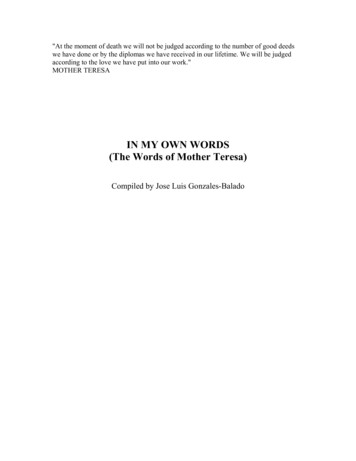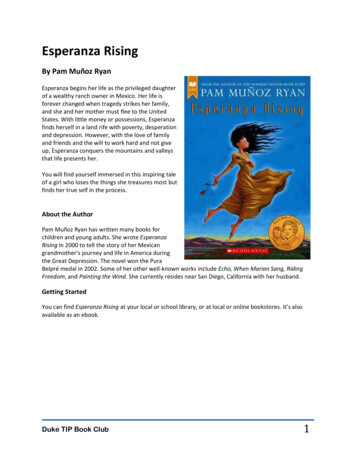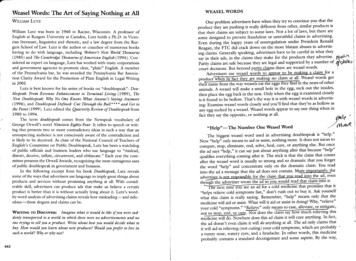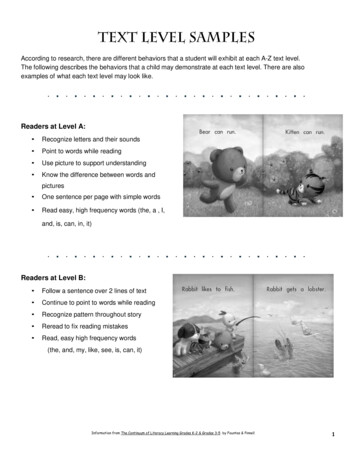
Transcription
"At the moment of death we will not be judged according to the number of good deedswe have done or by the diplomas we have received in our lifetime. We will be judgedaccording to the love we have put into our work."MOTHER TERESAIN MY OWN WORDS(The Words of Mother Teresa)Compiled by Jose Luis Gonzales-Balado
IN MY OWN WORDS (The Saying of Mother Teresa)Page 2
1.2.3.4.6.7.8.9.10.11.12.13.14.15.16.Table of ContentsINTRODUCTION . 5HOLINESS . 8PRAYER. 9GENEROSITY . 12LOVE. 19HOME AND FAMILY. 26VIRTUES. 29MARY. 32LIFE AND DEATH. 35SMILES . 38MONEY. 39SUFFERING. 40LONELINESS . 43GOD AND CHRISTIANTY. 45OUR MISSION. 48IN MY OWN WORDS (The Saying of Mother Teresa)Page 3
IN MY OWN WORDS (The Saying of Mother Teresa)Page 4
1. INTRODUCTIONIt would be a mistake to look for literary gems in an anthology of thoughts by MotherTeresa. She never felt compelled to write a literary work, not because she did notappreciate literature or was incapable of writing, but because to do so would detract fromthe natural beauty and intimacy of her thoughts and convictions. Instead, those of usfamiliar with the essential gospel message that appears in the Sermon on the Mount(Matthew 5:1-12) can clearly see the affinity between that message and what MotherTeresa said on occasion--precisely because the message was ingrained in each of herdaily acts.Who among us doesn't know that Mother Teresa's main objective had been to do all thegood she could for the least of Jesus' brothers and sisters? Her feelings for the lessfortunate were not arrived at by abstract reasoning, however. All she did, in her ownwords, was "follow Jesus' word."Not given to much talking, Mother Teresa spoke when only necessary. Thus her words,never labored nor many, were convincing.The anecdotes and sayings included this book are Mother Teresas's massages to thoseinvolved in her work: Co-workers, Sisters, and civic-minded groups eager to hear thewords of a person who lived the challenge she presented to others.When young Agnes Bojaxhiu(Mother Teresa's birth name) felt called to religious life, thechurch was feeling strong missionary impulse that characterized the papacy of Pope Pius11(1922-1939). Agnes, who voluntarily signed up to join a Catholic youth group in theJesuit parish of the Sacred Heart in her hometown of Skoplje, Albania, felt the missionarycalling very strongly. In 1928, when she was 18, Agnes moved to Ireland to join theSisters of Our Lady of Loreto, and become what she had hoped to be: a religious in acongregation dedicated to teach the daughters of the poor and the rich. She stayed inIreland three months.In 1929 young Agnes was sent to Calcutta, India, where she arrived on January 6--thefeast of the Epiphany, which was the manifestation" of the Lord! After a week in Calcuttashe was sent to Darjeeling near the Himalayas, to begin her novitiate. In 1937 Agnesprofessed permanent vows and took the name "Teresa." The Loreto convent housed theonly Catholic school for girls in Calcutta, and majority students were of Europeandescent, from more or less well-to -do families. Sister Teresa knew, however, that on theother side of the walls of the convent many human begins were living in shacks.She could have hidden the convent's massive walls and led peaceful life. But SisterTeresa was one of those rare people who talks Jesus at his word. She read a Scripture textthat seemed to challenge her directly, the one in which Jesus identifies with the poorest ofthe poor: "Truly I tell you, just as you did it to one of the least of these who are membersof my family, you did it to me"(Matthew 25:40). Several years later, she heard "a callIN MY OWN WORDS (The Saying of Mother Teresa)Page 5
within a call" and knew what she wanted to do for the rest of her life. One night in 1946,on a train bound to Darjeeling, Sister Teresa, in a moment of prayer, felt "aware of acalling in the midst of my vacation: I had to leave the convent (Loreto) and consecratemyself to help the poor, living among them."On August 16,1948, Sister Teresa faced the hard reality of the outskirts of the city, theslums of Calcutta. "Abandoning Loreto," she said, "was an even harder sacrifice for methan leaving my family that first time in order to follow my vacation. But I had to do it. Itwas a calling. I knew I had to go; I did not know how to get there."Soon after Mother Teresa departure from Loreto, some of her former students offered tofollow her. This small group made up the nucleus what would be a new religiouscongregation. Mother Teresa assured us that she did not have to think very hard to comeup with a name: "Missionaries of Charity--in other words, messengers of God's love tothe outskirts. The people don't see us doing anything else."Sister Teresa started working with those she found first: abandoned children. She pikedup them in a park, taught them basic habits of good hygiene, and helped them learn therudiments of the alphabet. She humbly admitted that "in determining which work wouldbe done, there was no planning at all. I headed the work in accordance to how I felt calledby the people's sufferings. God made me see what he wanted me to do."Therein lies the key to what the Missionary Sisters of Charity do and to what theirfoLndress's total commitment was all about. Mother Teresa was very clear in her goals:to love and served the poor, seeing Jesus in them. She always left the ways and means todo this in God's hands.One day Mother Teresa came up a woman dying on a sidewalk. Because she wanted toalleviate the woman's suffering by offering her a bed--a peaceful and dignified place todie--Mother Teresa took the woman with her. This act of mercy led Mother Teresa toopen the Home for the Dying, in August 1952, called Nirmal Hriday (Home of the PureHeart).Mother Teresa later came upon the abandoned children who were, in many instances, thesons and the daughters of the dying staying at Nirmal Hriday. To ease the children'splight, she opened Shishu Bharvan, the first of a series of children's homes that theMissionaries of Charity have founded outside of India. Since then, people with AIDS,and unwed mothers.As the results of Mother Teresa's work---which she always attributed to God's doing-other groups, equally dedicated to serving the poor, have come into existence. One ofthem is the Missionary Brothers of Charity. When a growing number of lay people beganimitating the Sister's and Brother's surrender to helping the poorest of the poor, MotherTeresa prayed for guidance and started a movement called Helpers of Mother Teresa.(She preferred another name: Helpers of Christ with Mother Teresa.) This group does nothelp the Missionaries of Charity with material resources; rather, the group's purpose is toIN MY OWN WORDS (The Saying of Mother Teresa)Page 6
help the poorest of the poor as images of Christ, while offering its members ways ofattaining personal consecration.Mother Teresa had been bestowed many awards, topped by the Nobel Peace Prize in1979. Other awards included doctorates honoris causa by many universities, and largecash prizes. She never considered any of these prizes and cash awards as personalproperty, but merely accepted them in the name of the poor--and spent every cent onthem.IN MY OWN WORDS (The Saying of Mother Teresa)Page 7
2. HOLINESS"Holiness does not consist in extraordinary things. It consists in accepting with a smile,what Jesus sends us. It consists in accepting and following the will of God."Holiness is not the luxury of a few. It is everyone's duty: yours and mine.In order to be saints, you have to seriously want to be one.Saint Thomas Aquinas assures us that holiness "is nothing else but a resolution made, theheroic act of a soul that surrenders to God." And he adds: "Spontaneously we love God,we run towards him, we run towards him, we get close to him, we possess him."Our willingness is important because it changes us into the image of God and likens us tohim! The decision to be holy is a very dear one.Renunciation, temptations, struggles, persecutions, and all kind of sacrifices are whatsurround the soul that has opted for holiness.If we do the work for God and for his glory, we may be sanctified.We should go out to meet people. Meet the people who live afar and those who live veryclose by. Meet the materially poor or the spiritually poor.The fact of death should not sadden us. The only thing that should sadden us is to knowthat we are not saints.To sometimes experieLce disgust is something quite natural. The virtue, which at timesis of heroic proportions, consists in being able to overcome disgust, for love of Jesus.This is the secret we discover in the lives of some saints: the ability to go beyond what ismerely natural.This is what happened to Saint Francis of Assisi. Once, when he ran into a leper who wascompletely disfigured, he instinctively backed up. Right away he overcame the disgust hefelt and kissed the face that was completely disfigured. What was the outcome of this?Francis felt himself filled with tremendous joy. He felt totally in control of himself.And the leper went on his way praising God.The saints are all the people who live according to the law God has given us.IN MY OWN WORDS (The Saying of Mother Teresa)Page 8
3. PRAYER"Prayer makes your heart bigger, until it is capable of containing the gift of God himself."Ibelieve that politicians spent too little time on their knees. I am convinced that theywould be better politicians if they were to do so.There are some people who, in order not to pray, use as an excuse the fact that life is sohectic that it prevents them from praying.This cannot be.Prayer does not demand that we interrupt our work, but that we continue working as if itwere a prayer.It is not necessary to always be meditating, nor to consciously experience the sensationthat we are talking to God, No matter how nice this would be. What matters is being withhim, living with him, in his will. To love with a pure heart, to love everybody, especiallyto love the poor, is a twenty-four-hours prayer.Prayer begets faith, faith begets love, and love begets service on behalf of the poor.Saint Francis of Assisi wrote the following prayer, which I like very much. Themissionaries of Charity pray it every day:Lord, make me an instrument of your peace:where there is hatred let me sow love;where there is injury, pardon;where there is doubt, faith;where there is despair, hope;where there is darkness, light;where there is sadness, joy;Lord, may I not so much seekto be consoled as to console;to be understand as to understand;IN MY OWN WORDS (The Saying of Mother Teresa)Page 9
to be loved as to love;Because it is in giving that we receive,in pardoning that we are pardoned.The first requirement for prayer is silence. People of prayer are people of silence.My secret is a very simple one: I pray. To pray to Christ is to love him.The apostles did not know how to pray, and they asked Jesus to teach them. He, then,taught them the Our Father.I think that every time we say the Our Father, God looks at his hands, where we areetched. "See, I have inscribed you on the palms of my hands."(Isaiah 49:16).What a beautiful description and also expressive of the personal love God feels for eachone of us!Make us, Lord, worthy to serve our brothers and sisters who are scattered all over theworld, whL live and die alone and poor. Give them today, using our hands, their dailybread. And using our love, give them peace and happiness. Amen.Prayer is not asking. Prayer is putting oneself in the hands of God, at his disposition, andlistening to his voice in the depth of our heartsThere is a player that the Missionaries of Charity pray every day.Cardinal Newman wrote it:Jesus, help me to spread your fragrance wherever I am.Fill my heart with your spirit and your life.Penetrate my being and take such hold of me that my life becomes a radiation of yourown life.Give your light through me and remain in me such a way that every soul I come incontact with can feel your presence in me.Remain in me, so that I shine with your light, and may others be illuminated by my light.All light will come from you, Oh Jesus.Not even smallest ray of light will be mine. You will illuminate others through me.IN MY OWN WORDS (The Saying of Mother Teresa)Page 10
Place on my lips your greatest praise, illuminating others around me.May I preach you with actions more than with words, with example of my actions, withthe visible light of the love that comes from you to my heart. Amen.I am asked what is one to do be sure that one is following the way of salvation. I answer:"Love God. And, above all, pray."Every day at communion time, I communicate two of my feelings to Jesus. One isgratefulness, because he has helped me to persevere until today.The other is a request: teach me to pray.Praying the Our Father and living it will lead us toward saintliness. The Our Fathercontains everything: God, ourselves, our neighbors.Silence will teach us a lot. It will teach us to speak with Christ and speak joyfully to ourbrothers and sisters.IN MY OWN WORDS (The Saying of Mother Teresa)Page 11
4. GENEROSITY"Without a sprit of sacrifice, without a life of prayer, without an intimate attitude ofpenance, we would not be capable of carrying our work."We feed ourselves, not to please our senses, but to show our Lord that we want to workfor him and with him, to live a life of sacrifice and reparation.I believe it was Saint Vincent de Paul who used to say to those who wanted to join hiscongregation: "Never forget, my children, that the poor are our masters. That is why weshould love them and serve them, with utter respect, and do what they bid us."Do you not believed that it can happen, on the other hand, that we treat the poor like theyare a garbage bag in which we throw everything we have no use for? Food we do not likeor that is going bad---we throw it there.Perishable goods past their expiration date, and which might harm us, go in the garbagebag: in other words, go to the poor. An article of clothing that is not in style anymore,that we do not want to wear again, goes to the poor.This does not show any respect for dignity of the poor; this is not consider them ourmasters, Like Saint Vincent de Paul taught his religious, but to consider them less thanour equals.One night, a man came to our house to tell me that a Hindu family, a family of eightchildren, ha not eaten anything for days.They had nothing to eat.I took enough rice for a meal and went to their house. I could see the hungry faces, thechildren with their bulging eyes. The sight could not have been more dramatic!The mother took the rice from my hands, divided it in half and went out. When she cameback a little later, I asked her: "Where did you go? What did you do?"She answered, "They also are hungry." "They" were the people next door, a Muslimfamily with the same number of children to feed and who did not have any food either.That mother was aware of the situation. She had the courage and the love to share hermeager portion of rice with others. In spite of her circumstances, I think she felt veryhappy to share with her neighbors the little I had taken her.In order not to take away her happiness, I did not take her anymore rice that night. I tookher some more the following day.IN MY OWN WORDS (The Saying of Mother Teresa)Page 12
Some years ago Calcutta experienced a great shortage of sugar. One day, a boy aboutfour years old came to see me with his parents. They brought me a small container ofsugar.When they handed it to me, the little one told me: "I have spent three days without eatingsugar. Take it. This is for your children."The little one loved with an intense love. He had expressed it by a personal sacrifice. Irepeat: he was no more than three or four years old. He could hardly say my name. I didnot know him; I had never seen him before. Nor had I met his parents. The boy made thatdecision after he found out, from the grownups, about my situation.What is a Christian?" someone asked a Hindu man. He responded, "The Christian issomeone who gives."I ask you one thing: do not tire of giving, but do not give your leftovers. Give until ithurts, until you feel the pain.Open your hearts to the love God instills in them. God loves you tenderly. What he givesyou is not to be kept under lock and key, but to be shared.The more you save, the less you will be able to give. The less you have, the more youwill know how to share.Let us ask God, when it comes time to ask him for something, to help us to be generous.If one gives a little bit of rice to a poor person in India, that person feels satisfied andhappy. The more in Europe do not accept their poverty, and for many it is a source ofdespair.It was late in the day (around ten at night) when doorbell rang. I opened the door andfound a man shivering from the cold."Mother Teresa, I heard that you just received an important prize. When I heard this Idecided to offer you something too. Here you have it: this is what I collected today."IN MY OWN WORDS (The Saying of Mother Teresa)Page 13
It was little, but in his case it was everything.I was moved more than by the Novel prize.One day a young couple came to our house and asked for me. They gave me a largeamount of money.I asked them, "Where did you get so much money?"They answered, "We got married two days ago. Before we got married we had decidednoL to celebrate the wedding, not to buy wedding clothes, not to have a reception or ahoneymoon. We wanted to give you the money I saved."I know what such a decision meant, especially for a Hindu family.That is why I asked them, "But how did you think of such a thing?""We love each other so much," they answered, "that we wanted to share the joy of ourlove with those you serve."To share: what a beautiful thing!We should learn how to give.But we should regard giving as an obligation, but as a desire.I usually say to our Co-Workers: "I do not need your surplus. I do not want you to giveme your leftovers. Our poor do not need your condescending attitude nor your pity. Thepoor need your love and your kindness."If we worry too much about ourselves, we won't have time for others.Not long ago I received a beautiful letter and a sizable donation from an Italian child whohad just made his first Communion. In his letter he explained that before he made his firstCommunion, he had asked his parents not to buy him a special suit, nor to have a party tocelebrate the occasion. And he also said he ha told his relatives and friends not to givehim any gifts. He would give everything up in exchange for the money they would havespent in order to send it to Mother Teresa.It was a beautiful demonstration of generosity by the child.I saw in it the ability to sacrifice, to deprive himself of something.IN MY OWN WORDS (The Saying of Mother Teresa)Page 14
5. CHRIST IN THE POOR"The poor are great! The poor are wonderful! The poor are very generous! They give usmuch more than we give them."Today it is very fashionable to talk about the poor. Unfortunately, it is not fashionable totalk with them.All the desolation of the poor, not only their material poverty but their spiritual woundsas well, need to be redeemed. We should share with them because only if we are unitedwith them can we redeem them, bringing God to their lives and they, in turn, to God.A way of satisfying our brethren's' hunger is to share with them whatever we have--toshare with them until we ourselves feel what they feel.I have the feeling that we are in such a hurry that we don not even have time to look atone another and simile.Do we share with the poor, just like Jesus shared with us?Whoever the poorest of the poor are, they are Christ for us---Christ under the guise ofhuman suffering.The Missionaries of Charity are firmly convinced that each time we offer help to thepoor, we really offer help to Christ.Our food, our dress: it all must be just like the poor. The poor are Christ himself.I think that the work of the Church in this developed and rich Western Hemisphere ismore difficult than in Calcutta, South Yemen, or other areas where the needs of thepeople are reduced to the clothes needed to ward off the cold, or a dish of rice to curbtheir hunger---anything that will show them that someone loves them. In the West theproblems the poor have go much deeper; the problems are in the depths of their hearts.IN MY OWN WORDS (The Saying of Mother Teresa)Page 15
"Even though we might have to expel all missionaries," the prime minister of Ethiopiatold me, "we will not allow your Sisters to leave because I am told, and I have checked itmyself to be true, that you truly love the poor and take care of them."When a poor person dies of hunger, it has not happened because God did not take care ofhim or her. It has happened because neither you nor I wanted to give that person what heor she needed. We have refused to be instruments of love in the hands of God to give thepoor a piece of bread, to offer them a dress with which to ward off the cold. It hashappened because we did not recognize Christ when, once more, he appeared under theguise of pain, identified with a man numb from the cold, dying of hunger, when he camein a lonely human being, in a lost child in search of a home.To be happy with God on earth presupposes certain things: to love the way he loves; tohelp the way he helps; to give the way he gives; to save the way he saves; to remain in hispresence twenty-four hours a day; to touch him in the poor and in those who suffer.A great poverty reigns in a country that allow taking the life of an unborn child--a childcreated in God's image, created to live and to love. His or her life is not for destroying butfor living, despite the selfishness of those who fear that they lack the means to feed oreducate one more child.When we touch the sick and needy, we touch the suffering body of Christ.The poor call to us. We have to be aware of them in order to love them. We have to askourselves if we know the truth. Do we know the poor in our own homes?Sometimes people can hunger for more than bread.It is possible that our children, our husband, our wife, do not hunger for bread, do notneed clothes, and do not lack a house. But are we equally sure that none of them feelsalone, abandoned, neglected, and needing some affection? That, too, is poverty.Christ, being rich, become poor (2 Corinthians 8:9). If we want to imitate Christ, who inspite of being rich became poor and practiced poverty, we have to do what he does.IN MY OWN WORDS (The Saying of Mother Teresa)Page 16
There are people who want to be poor and live like the poor,but at the same time they liketo have valuable things. In reality, this is just being rich; they want the best of bothworlds.The Missionaries of Charity cannot do this; it would be a contradiction.Christ could have chosen a royal palace as his home. However, in order to be like us, hechose to be like us in all things but sin (Hebrew 4:15).We, in order to be like the poor, choose to be like them in all things except in their stateof misery.If there are poor on the moon, we will go there too.The demands, and consequently the needs, are the same, or very similar, no matter wherewe are in the world.In spite of everything, I think that in the West, I general, the needs are mostly spiritual.Material needs, in most cases, are taken care of. Rather, there is an immense spiritualpoverty.We are at the service of the poor. But are we capable, are we willing to share the povertyof the poor? Do we identify with the poor whom we serve? Do we really feel in solidaritywith them? Do we share with them just like Jesus shares with us?The poor anywhere in the world are Christ who suffers. In them, the Son of God lives anddies. Through them, God shows his face.All my years of service to the poor have helped me to understand that they are preciselythe ones who better understand human dignity. If they have a problem, it is not lack ofmoney, but the fact that their right to be treated humanly and with tenderness is notrecognized.Jesus comes to meet us. To welcome him, let us go to meet him.IN MY OWN WORDS (The Saying of Mother Teresa)Page 17
He comes to us in the hungry, the naked, the lonely, the alcoholic, the drug addict, theprostitute, the street beggars.He may come to you or me in a father who is alone, in a mother, in a brother, or in asister.If we reject them, if we do not go out to meet them, we reject Jesus himself.The important thing is not to do a lot or to do everything. The important thing is to beready for anything, at all times; to be convinced that when serving the poor, we reallyserve God.Poverty has not been created by God. We are the ones who have created poverty.Before God, we are all poor.Before judging the poor, we have to examine with sincerity our own conscience.If abortion becomes legalized in rich countries, those countries those countries truly arethe poorest in the world.Jesus is the one we take care of, visit, clothe, feed, and comfort every time we do this tothe poorest of the poor, to the sick, to the dying, to the lepers, and to the ones who sufferfrom AIDS.We should not serve the poor like they were Jesus. We should serve the poor becausethey are Jesus.IN MY OWN WORDS (The Saying of Mother Teresa)Page 18
6. LOVE"The less we have, the more we give. Seems absurd, but it's the logic of love."When a young lady of the upper class chooses to place herself at the service of the poor,it causes an authentic revolution, the biggest, the most difficult one: the revolution oflove.It is very compelling that before Jesus explained God' words, before he explained thebeatitudes to the crowd, he felt compassion for them and fed them (Matthew 5).Only after they were fed did he start to teach theL.True love causes pain.Jesus, in order to give us the proof of his love, died on the cross.A mother, in order to give birth to her baby, has to suffer.If you really love one another, you will not be able to avoid making sacrifices.The poor do not need our condescending attitude or our pity. They only need our loveand our tenderness.To me, Jesus is the Life I want to live, the Light I want to reflect, the Way to the Father,the Love I want to express, the Joy I want to share, the Peace I want to sow around me.Jesus is everything to me.If faith is scarce, it is because there is too much selfishness in the world, too muchegoism. Faith, in order to be authentic, has to be generous and giving.Love and faith go hand in hand.IN MY OWN WORDS (The Saying of Mother Teresa)Page 19
Today countries are concentrating too much on efforts and means to defend their borders.Yet these countries know so little about the poverty and suffering that make the humanbeings who live inside such borders feel so lonely!If instead they would worry about giving these defenseless beings some food, someshelter, some healthcare, some clothes, it is undeniable that the world would be a morepeaceful and happy place to live.I tell my sisters that when we lovingly help Christ in the poor, we do not do it like socialworkers. We do it like contemplative in the world.Someone once told me that not even for a million dollars would the touch a leper. Iresponded: "Neither would I. If it were a case of money, I would not even do it for twomillion. On the other hand, I do it gladly for love of God."I pay no attention to numbers; what matters is the people. I rely on one. There is onlyone: Jesus.I will never tire of repeating this: what the poor need the more is not pity but love. Theyneed to feel respect for their human dignity, which is neither less nor different from thedignity of any other human being.To help us be worthy of heaven, Christ put as a condition that at our hour of death, youand I, regardless of whom we were (Christians or non-Christians, each human being hasbeen created by the loving hand of God in his own likeness), will stand before God andbe judged according to how we have acted toward the poor (Matthew 25:40).In Christ, who died on the cross for us, we can definitely confirm the fact that sufferingcan transform itself into a great love and an extraordinary generosity.To love and to serve the poor presupposes something that has nothing to do with givingthem our leftovers, or giving them the food we do not like. It has nothing to do withgiving
One day Mother Teresa came up a woman dying on a sidewalk. Because she wanted to alleviate the woman's suffering by offering her a bed--a peaceful and dignified place to die--Mother Teresa took the woman with her. This act of mercy led Mother Teresa to open the Home for the Dying, in August 1952, called Nirmal Hriday (Home of the Pure Heart).











